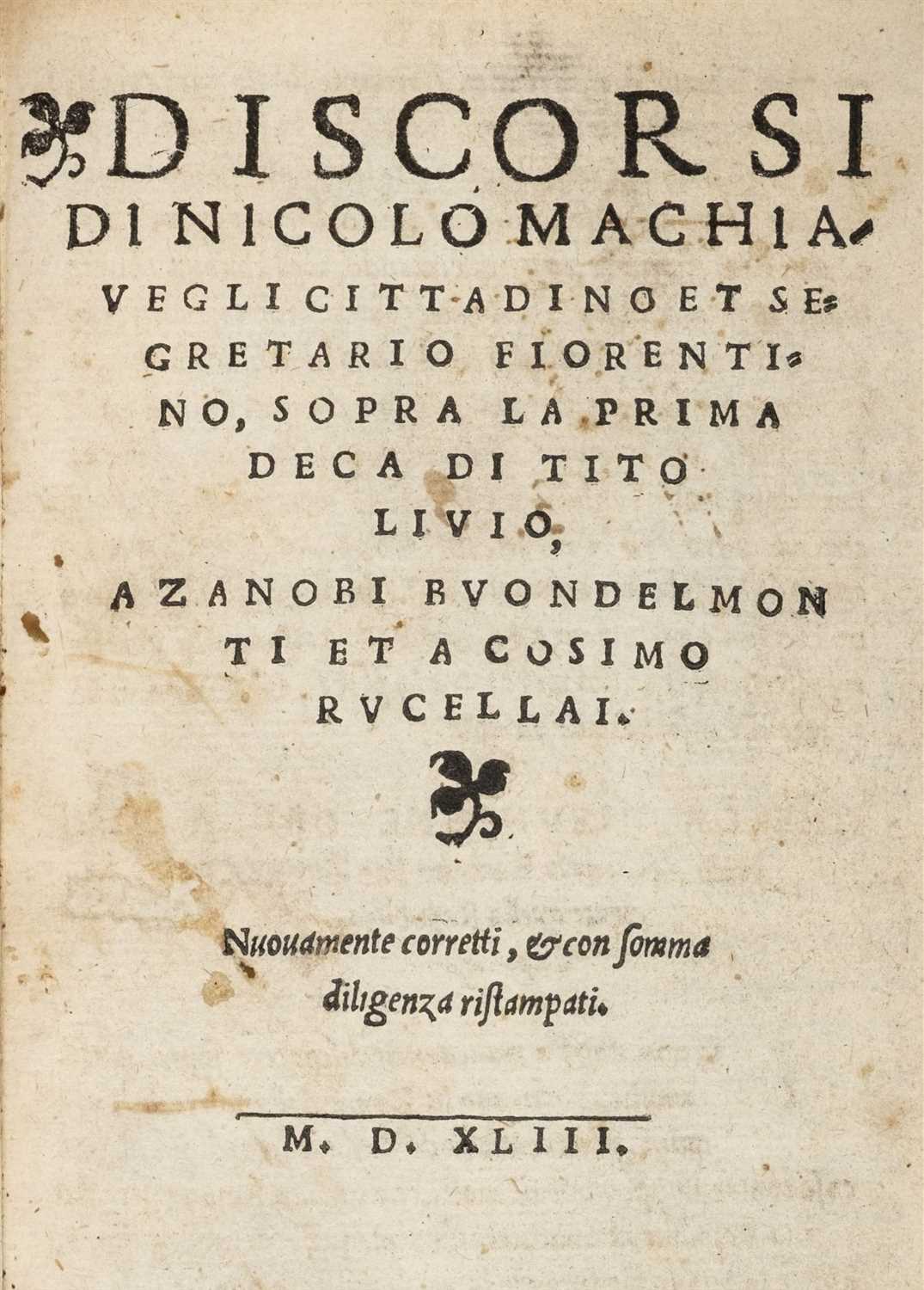MACHIAVELLI, Niccolò (1469-1527). Discorsi ... sopra la Prima Deca di Tito Livio . Florence: Bernardo Giunta, 10 November 1531. 4° (203 x 134 mm). Collation: AA 6 A-T 8 V 4 . 162 leaves. Italic type. Woodcut printer's device on title and verso of last-leaf. Initial spaces with guide letters. (Title a bit soiled and with 4 small holes affecting one letter, light marginal foxing to first and last few leaves, lightly washed, E3.4 bound in reverse order.) 19th-century parchment gilt over pasteboard. Second edition, published three weeks after the first. Machiavelli began his essay on the first Decade of Livy shortly after his forced retirement in 1513 to his country estate, but he soon interrupted it to devote his energies to Il principe , a development of one of several themes touched upon in the Discorsi , to which he returned upon finishing his more celebrated work. Livy was only the point of departure for the the Discorsi , in which Machiavelli set forth his own views on the origins and perpetuation of states and principalities in general. This Giunta edition is at least as rare as Antonio Blado's edition of 18 October 1531, and it was considered by Gamba, Brunet and others to be the true or "legitimate" first edition. In fact, the two editions were published independently of each other, inadvertently setting off a frenetic race between the two publishers. Earlier that year Blado had obtained a privilege from Pope Clement VII to print the text of a manuscript of the work which was at that time apparently in the possession of the Pope's nephew Cardinal Ridolfi, and which may have been the manuscript that Machiavelli had himself sent to the Pope; the papal privilege appears at the head of Blado's edition. Meanwhile, back in Florence, Giunta, unaware of Blado's project, had decided, with the approval of the author's heirs, to honor Machiavelli in the city of his birth by producing printed editions of his as yet unpublished major works (the Giuntas having been the first to print the Arte della guerra in 1521). With his own printing nearly finished, the news of the Rome edition came as a shock to Giunta. Arguing that he and not Blado had been given the authorization of the authors' heirs, he immediately applied for and duly received the Pope's permission not only to publish his own edition, overriding Blado's privilege, but also (in a papal brief dated 20 December 1531) to continue the project of printing Florentine editions of the remaining works. Hence the rush of both printers to issue the first edition of each of the remaining works. Blado won in both cases, coming out well ahead with Il principe , but publishing his edition of the Historie fiorentine only two days before Giunta's. Bertelli & Innocenti 12; Brunet III, 1273; Gamba 603; W. Pettas, The Giunti of Florence (1980), pp. 71-72.
MACHIAVELLI, Niccolò (1469-1527). Discorsi ... sopra la Prima Deca di Tito Livio . Florence: Bernardo Giunta, 10 November 1531. 4° (203 x 134 mm). Collation: AA 6 A-T 8 V 4 . 162 leaves. Italic type. Woodcut printer's device on title and verso of last-leaf. Initial spaces with guide letters. (Title a bit soiled and with 4 small holes affecting one letter, light marginal foxing to first and last few leaves, lightly washed, E3.4 bound in reverse order.) 19th-century parchment gilt over pasteboard. Second edition, published three weeks after the first. Machiavelli began his essay on the first Decade of Livy shortly after his forced retirement in 1513 to his country estate, but he soon interrupted it to devote his energies to Il principe , a development of one of several themes touched upon in the Discorsi , to which he returned upon finishing his more celebrated work. Livy was only the point of departure for the the Discorsi , in which Machiavelli set forth his own views on the origins and perpetuation of states and principalities in general. This Giunta edition is at least as rare as Antonio Blado's edition of 18 October 1531, and it was considered by Gamba, Brunet and others to be the true or "legitimate" first edition. In fact, the two editions were published independently of each other, inadvertently setting off a frenetic race between the two publishers. Earlier that year Blado had obtained a privilege from Pope Clement VII to print the text of a manuscript of the work which was at that time apparently in the possession of the Pope's nephew Cardinal Ridolfi, and which may have been the manuscript that Machiavelli had himself sent to the Pope; the papal privilege appears at the head of Blado's edition. Meanwhile, back in Florence, Giunta, unaware of Blado's project, had decided, with the approval of the author's heirs, to honor Machiavelli in the city of his birth by producing printed editions of his as yet unpublished major works (the Giuntas having been the first to print the Arte della guerra in 1521). With his own printing nearly finished, the news of the Rome edition came as a shock to Giunta. Arguing that he and not Blado had been given the authorization of the authors' heirs, he immediately applied for and duly received the Pope's permission not only to publish his own edition, overriding Blado's privilege, but also (in a papal brief dated 20 December 1531) to continue the project of printing Florentine editions of the remaining works. Hence the rush of both printers to issue the first edition of each of the remaining works. Blado won in both cases, coming out well ahead with Il principe , but publishing his edition of the Historie fiorentine only two days before Giunta's. Bertelli & Innocenti 12; Brunet III, 1273; Gamba 603; W. Pettas, The Giunti of Florence (1980), pp. 71-72.














Testen Sie LotSearch und seine Premium-Features 7 Tage - ohne Kosten!
Lassen Sie sich automatisch über neue Objekte in kommenden Auktionen benachrichtigen.
Suchauftrag anlegen